ZTE, Huawei hope to ring up sales in Europe
Updated: 2014-04-08 07:24
By Shen Jingting (China Daily USA)
|
||||||||
Chinese telecom equipment vendors have expressed optimism about the future development in the European market, with company officials saying they plan to invest more in the region.
Shenzhen-based ZTE Corp, the world's fifth-largest maker of telecom equipment by sales, is looking for double-digit growth in terms of revenue in Europe over the next five years, Xiong Hui, senior vice-president of ZTE, told China Daily.
After entering the European market in 2002, ZTE experienced a rough start, gaining few contracts in the first few years. But the company sped up its expansion in 2008 after securing mobile phone orders from such leading carriers as Vodafone Group.
Xiong said ZTE has achieved fast annual growth in Europe, where its annual revenue rose to a record of 1 billion euros ($1.38 billion) in 2013, with telecom equipment sales contributing about 60 percent and the mobile phone business accounting for the rest. The company expects a 50 percent rise in revenue this year, Xiong said.
"We see a lot of opportunities there (in Europe)," Xiong said. "In countries such as Germany and Spain, we are operating projects worth more than 100 million euros."
Unlike the United States or Australia, which have accused Chinese telecom companies of being unreliable in terms of cybersecurity, European countries generally have taken an open and cooperative stance toward Chinese companies.
But Xiong admitted that Europe is full of rivals, like Sweden's Ericsson and Finland-based Nokia.
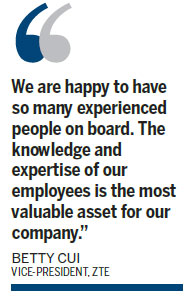
The competition "might be familiar with the local environment, has been present in the market for a long time and has strong R&D capabilities. But ZTE has its own advantages", said Xiong.
He pointed out that Chinese telecom companies are consistently able to deliver high-quality equipment and good service at a competitive price, creating more value for operators. Meanwhile, the innovation capability of Chinese telecom firms has greatly improved, helping them to win trust and gain more market share, Xiong said.
Since 2006, Germany has been the most important single market for ZTE in Europe. The company has recently acquired Lucent Network Services GmbH in January, boosting its German employees to more than 900 people after getting about 750 employees from Alcatel-Lucent. The company did not reveal specific financial figures.
"We are happy to have so many experienced people on board. The knowledge and expertise of our employees is the most valuable asset for our company," said Betty Cui, vice-president of ZTE. In February, ZTE announced its integrated German team had taken over the responsibility for the rollout and network operation of the E-Plus mobile communications network there.
Cui emphasized that ZTE's efforts in ensuring seamless continuity in the maintenance of the E-Plus network paved the way for the company getting more managed services projects in Germany, as well as elsewhere in Europe.
Huawei Technologies Co Ltd, another of the world's leading telecom equipment vendors and also based in Shenzhen, began exploring the European market even earlier than ZTE. Huawei established its operations there in 2000 and built close ties with nearly all operators in the region.
As of December, Huawei had about 7,700 employees in Europe, among whom more than 850 were working in research and development.
In France, for example, Huawei plans to have more than 1,200 employees in place by 2017, adding about 600 new jobs to the local market from 2013, according to Ren Zhengfei, founder and chief executive officer of Huawei.
shenjingting@chinadaily.com.cn
(China Daily USA 04/08/2014 page16)

 Vigil marks one month since MH370 vanished
Vigil marks one month since MH370 vanished
 The world in photos: March 31-April 6
The world in photos: March 31-April 6
 Simply child's play
Simply child's play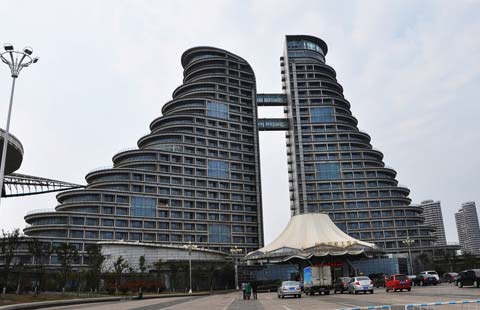
 Photo special: Weird buildings in China
Photo special: Weird buildings in China
 Jackie Chan holds charity concert marking 60th birthday
Jackie Chan holds charity concert marking 60th birthday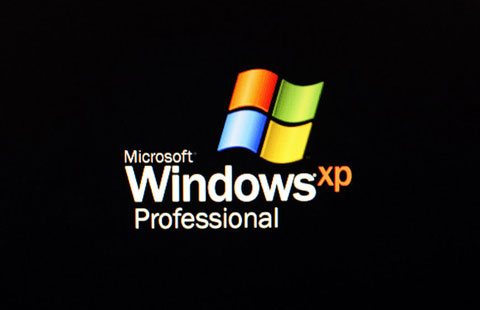
 Microsoft to end support for Windows XP
Microsoft to end support for Windows XP
 Poor weather greets baby prince
Poor weather greets baby prince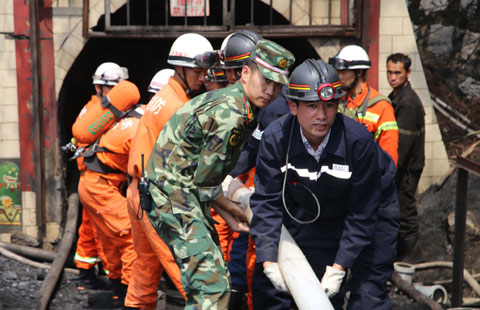
 22 miners trapped in Yunnan coal mine flood
22 miners trapped in Yunnan coal mine flood
Most Viewed
Editor's Picks

|
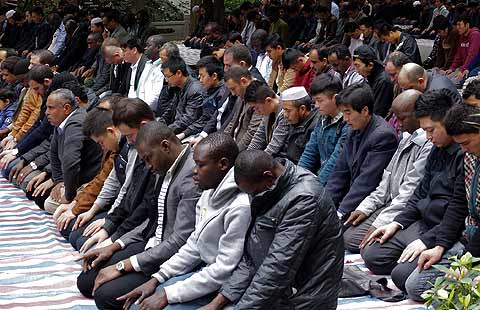
|

|

|

|

|
Today's Top News
Chinese, US defense chiefs begin talks
Time runs short in black box hunt
US warns China over yuan
Hagel's insensible remarks
Media: Japan, US differ in alliance expectations
Pro-Russians declare independence in Donetsk
China tours by Pentagon chiefs
Chinese military institutions visited by US officials
US Weekly

|

|







